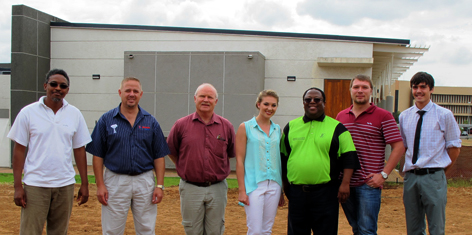
From the left are: Nixon Teis, lecturer; Johan Coetzee, discipline coordinator; Prof Okkie Combrinck, lecturer; Annamarie Otto, lecturer; Prof Sechaba Mahlomaholo, Head: School MNST; Albert Kemp, lecturer and Izak Scott, student assistant.
New Engineering Graphics Education classrooms enrich, empower and enhance education
This year, Technology Education at the university will embark on a new endeavour. The development of new Engineering Graphics Education classrooms and a Technology laboratory will help shape excellence in the work of future educational technology students. These classrooms will be equipped with the latest educational and technological equipment to meet the needs of current and future students.
The new expansion will form part of the current Mathematics, Natural Sciences and Technology (MNST) Education Building, situated across the road from the Winkie Direko Education Building. Technology education embarks on a journey to enrich, empower and enhance education students. It aims to ensure that students will not only evolve in their teaching profession, but also establish a level of excellence that will drive their generation to become Technology educational leaders in their community. The educational laboratories are set for completion during middle September 2014.